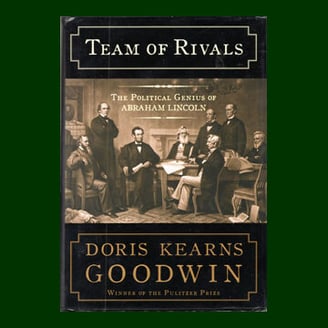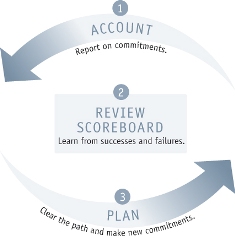History has long been one of my favorite subjects, and between my business reading, I interject historical books including biographies of great leaders.
Doris Kearns’ Team of Rivals: The Political Genius of Abraham Lincoln powerfully details Lincoln’s rise to political power while sharing intimate details of his successes and failures. It dives into how his cabinet included Attorney General Edward Bates, Secretary of War Simon Cameron, Secretary of the Treasury Salmon Chase, and Secretary of State William H. Seward, who had all run against Lincoln for the 1860 Republican nomination.
Part of the reason these four men lost to Lincoln was the enemies they had made among prominent delegates and constituents. Lincoln, even when dealt significant blows to his ego and reputation by his rivals never embittered his enemies.
His compassion and empathy for his opponents is the theme of the book.
I discovered 6 Character Traits of Lincoln to spotlight for this blog. No doubt I’ve missed several prominent ones as well. Politics today is a very caustic and challenging arena. It was in the 1800’s as well.
Here are the traits I isolated for Lincoln, from Team of Rivals, with examples and reasons to consider for your leadership development.
Self-awareness – Author Kearns shares, “His success(Lincoln’s) in dealing with the strong egos of the men in his cabinet suggests that in the hands of a truly great politician the qualities we generally associate with decency and morality—kindness, sensitivity, compassion, honesty, and empathy—can also be impressive political resources. Moreover, Lincoln possessed an uncanny understanding of his shifting  moods, a profound self-awareness that enabled him to find constructive ways to alleviate sadness and stress. Indeed, when he is compared with his colleagues, … he possesses the most even-tempered disposition of them all. LINCOLN’S ABILITY TO RETAIN his emotional balance in such difficult situations was rooted in an acute self-awareness and an enormous capacity to dispel anxiety in constructive ways.”
moods, a profound self-awareness that enabled him to find constructive ways to alleviate sadness and stress. Indeed, when he is compared with his colleagues, … he possesses the most even-tempered disposition of them all. LINCOLN’S ABILITY TO RETAIN his emotional balance in such difficult situations was rooted in an acute self-awareness and an enormous capacity to dispel anxiety in constructive ways.”
Keep enemies close – Lincoln’s initial cabinet included 4 political opponents (rivals), Attorney General Edward Bates, Secretary of War Simon Cameron, Secretary of the Treasury Salmon Chase, and Secretary of State William H. Seward for the Republican Presidential nomination in 1860. In addition, Edwin Stanton was initially critical of Lincoln. More than half of Lincoln’s initial cabinet was made up of enemies/rivals to Lincoln. Lincoln believed spirited conflict/discussion led to better decision-making and felt having the most qualified people in his cabinet was necessary to win the war.
Take nothing personal - Lincoln chose Edwin Stanton to be Secretary of War, despite Stanton’s first impression and subsequent dislike for Lincoln. Kearns described their first meeting, Lincoln introduced himself and proposed, “Let’s go up in a gang.” At this point, Stanton drew Harding aside and whispered, “Why did you bring that d——d long-armed Ape here . . . he does not know anything and can do you no good.” With that, Stanton and Harding turned from Lincoln and continued to court on their own. As for Stanton, despite his initial contempt for the “long-armed Ape,” he would not only accept the offer (cabinet) but come to respect and love Lincoln more than any person outside of his immediate family. Stanton was with Lincoln when he made his transition and is quoted, ““Now he belongs to the ages.”
 Purpose - President Abraham Lincoln's main goal in the American Civil War was to preserve the Union, not to free the slaves. He initially supported Unionism, but as the war progressed, he came to see that saving the Union was inseparable from African American freedom. In his 1863 Gettysburg Address, he argued that the war must lead to “a new birth of freedom” or it would have been fought in vain
Purpose - President Abraham Lincoln's main goal in the American Civil War was to preserve the Union, not to free the slaves. He initially supported Unionism, but as the war progressed, he came to see that saving the Union was inseparable from African American freedom. In his 1863 Gettysburg Address, he argued that the war must lead to “a new birth of freedom” or it would have been fought in vain
Vision – Lincoln’s vision for a nation that provides equality for all its citizens, creates a unified nation no longer dominated by states' rights, and defines democracy in terms of “government of the people, by the people, for the people.” In 9 Presidents Who Screwed Up America And Four Who Tried to Save Her, author Brion McClanahan submits Lincoln was one of the worst presidents at following the implicit requirements of the President to uphold the constitution. To keep the Union together it required making the President’s executive authority stronger.
 Story Telling (and wit) - Time and again, Lincoln dispelled his colleagues’ anxiety and sustained their spirits with his gift for storytelling and his life-affirming sense of humor. Self-deprecating humor came naturally to Lincoln; once after being called "two-faced," he quipped, “If I had two faces, why would I be wearing this one?”
Story Telling (and wit) - Time and again, Lincoln dispelled his colleagues’ anxiety and sustained their spirits with his gift for storytelling and his life-affirming sense of humor. Self-deprecating humor came naturally to Lincoln; once after being called "two-faced," he quipped, “If I had two faces, why would I be wearing this one?”
Another story he told….[While riding a train,] I was once accosted … by a stranger, who said, "Excuse me, sir, but I have an article in my possession which rightfully belongs to you." "How is that?" I asked, considerably astonished. The stranger took a jackknife from his pocket. "This knife," said he, "was placed in my hands some years ago with the injunction that I was to keep it until I found a man uglier than myself. I have carried it from that time to this. Allow me now to say, sir, that I think you are fairly entitled to the property.”
If you decide to read/listen to Team of Rivals, Lincoln’s leadership skills will impress you and you will learn several ways to improve yours.
To create an environment where everyone is inspired to give their best, contact Positioning Systems to schedule a free exploratory meeting.
Let’s help you to turn your business into a growth organization!
Growth demands Strategic Discipline.
%20and%20Warren%20Buffett..png?width=293&height=147&name=Charlie%20Munger%20(right)%20and%20Warren%20Buffett..png) I’ve shared my story of Acute Myeloid Leukemia in 2012 when doctors gave me less than a 2% chance of survival. Warren Buffet was asked at the Berkshire-Hathaway Shareholders meeting what he would do if he had one more day to spend with his recently deceased partner Charlie Munger. Next blog Buffet’s thoughtful response
I’ve shared my story of Acute Myeloid Leukemia in 2012 when doctors gave me less than a 2% chance of survival. Warren Buffet was asked at the Berkshire-Hathaway Shareholders meeting what he would do if he had one more day to spend with his recently deceased partner Charlie Munger. Next blog Buffet’s thoughtful response
Building an enduring great organization requires disciplined people, disciplined thought, disciplined action, superior results, producing a distinctive impact on the world.
 Discipline sustains momentum, over a long period of time, laying the foundations for lasting endurance.
Discipline sustains momentum, over a long period of time, laying the foundations for lasting endurance.
A winning habit starts with 3 Strategic Disciplines: Priority, Metrics, and Meeting Rhythms. Forecasting, accountability, individual, and team performance improve dramatically.
Meeting Rhythms achieve a disciplined focus on performance metrics to drive growth.
Let Positioning Systems help your business achieve these outcomes on the Four most Important Decisions your business faces:
|
DECISION |
RESULT/OUTCOME |
|
PEOPLE |
|
|
STRATEGY |
|
|
EXECUTION |
|
|
CASH |
|
Positioning Systems helps mid-sized ($5M - $500M+) businesses Scale-UP. We align your business to focus on Your One Thing! Contact dwick@positioningsystems.com to Scale Up your business! Take our Four Decisions Needs Assessment to discover how your business measures against other Scaled Up companies. We’ll contact you.
NEXT BLOG – One More Day – Warren Buffet on Charlie Munger






.jpeg?width=150&height=135&name=Hand%20with%20marker%20writing%20the%20question%20Whats%20Next_%20(1).jpeg)

